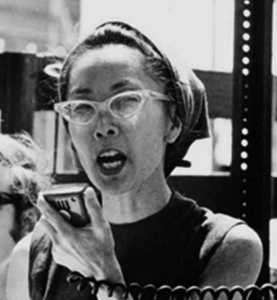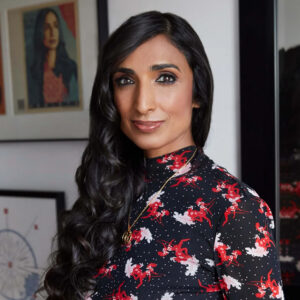Yuri Kochiyama
 The legacy I would like to leave is that people try to build bridges and not walls. – Yuri Kochiyama
The legacy I would like to leave is that people try to build bridges and not walls. – Yuri Kochiyama
Born in San Pedro, California in 1921, to prosperous parents who had emigrated from Japan, Mary Yuriko (Yuri) Nakahara Kochiyama once described herself as “red, white and blue: I just thought America was such a wonderful country…”
Unfortunately, her happy life changed dramatically after the Japanese attacked Pearl Harbor and a series of tragedies befell her family. Suspected of having ties to Japan, her father was arrested and, due to failing health, died soon after being released. In 1942, pursuant to President Roosevelt’s Executive Order 9066, Kochiyama, her twin brother and mother were sent to a concentration camp in Arkansas for two years. They, like many other Asian Americans, “were deemed a threat to national security.” This experience deeply affected Yuri making her far more empathetic to the struggles of all marginalized peoples and laying the groundwork for a life devoted to fighting for social justice.
Soon after her release from the camp, Kochiyama moved to New York City, married Bill Kochiyama, a Japanese American veteran of World War II, and raised their six children. Kochiyama did not become politically active until she was living in Harlem during the 1960s. There she met many Black civil rights activists, including Malcolm X, and was drawn to her neighbors’ work to achieve equal rights for African Americans and a quality education for all children. She hosted Freedom Riders and survivors of the atomic bombing of Hiroshima in her home. She supported the Puerto Rican Independence Movement, and worked for the release of many political prisoners.
In the 1980s, Yuri and her husband, who had long advocated for reparations and a government apology for the incarceration of Japanese Americans during World War II, testified before Congress to advance support for this cause. Their efforts were rewarded when President Ronald Reagan signed the Civil Liberties Act in 1988, which, among its many provisions, awarded $20,000 to each Japanese American internment survivor. This success reinvigorated her advocacy for reparations for descendants of enslaved Americans.
She is the subject of several biographies, most notably, Heartbeat of a Struggle: The Revolutionary Life of Yuri Kochiyama by Diane Carol Fujino, a documentary and several plays about her life and work.
She remained politically active until her death in 2014, protesting discrimination against Muslims after 9/11 and all forms of racial profiling. Although her ardent support for some extremely unpopular causes and their leaders later in life diminished her reputation and caused some to question her patriotism, Kochiyama’s commitment to social justice remains undeniable.
VALARIE KAUR
 Valarie Kaur grew up in Clovis, CA, the daughter of a Sikh family of farmers who immigrated about 100 years ago from Punjab, India. Shortly after 9/11 a personal family friend, Balbir Singh Sodhi was murdered, the first of many hate crimes. Valarie’s life hasn’t been the same since.
Valarie Kaur grew up in Clovis, CA, the daughter of a Sikh family of farmers who immigrated about 100 years ago from Punjab, India. Shortly after 9/11 a personal family friend, Balbir Singh Sodhi was murdered, the first of many hate crimes. Valarie’s life hasn’t been the same since.
Valarie was greatly influenced by her grandfather. He taught her wisdom through stories and songs. He taught her about the sage warrior who was believed to be an ancestor within their culture: the sage, representing love, and the warrior, representing the fighter.
After Stanford, Valarie went on to receive a Master’s degree from Yale in theology and a Juris Doctor (JD) degree from Yale Law School.
Even during her years of study, she fought for civil rights. Her focus was hate crimes, racism, profiling, gun violence, immigration, solitary confinement, LGBTQI equality, internet freedom. She and her husband, Sharat Raju, started to make documentary films on social justice issues, beginning with Divided We Fall: Americans in the Aftermath.
“The way we make change is just as important as the change we make.” Her work includes education in combating hate crimes against Muslim and Sikh Americans. Her work is to equip advocates as they intersect in spirituality, storytelling, and justice.
This work led to the founding of the Groundswell Movement, a multi-faith online community. These 30,000+ people are known for “dynamically strengthening faith-based organizing in the 21st century.”
“Love is…a labor of actions repeated over and over to care for others and ourselves, the stranger, and to try to understand our enemies as still somehow a part of us.”
The words and wisdom of her grandfather became the foundation for her Revolutionary Love Project. Through Auburn Theological Seminary this beloved community seeks to inspire and equip people to change the world. This is a choice to labor for others, for opponents, and for themselves.
To get this message to the world, in 2020 Valarie wrote the book SEE NO STRANGER: a Memoir and Manifest of Revolutionary Love. She opens her readers to this question”.
“The future is dark. Is this darkness of the tomb – or of the womb?”

